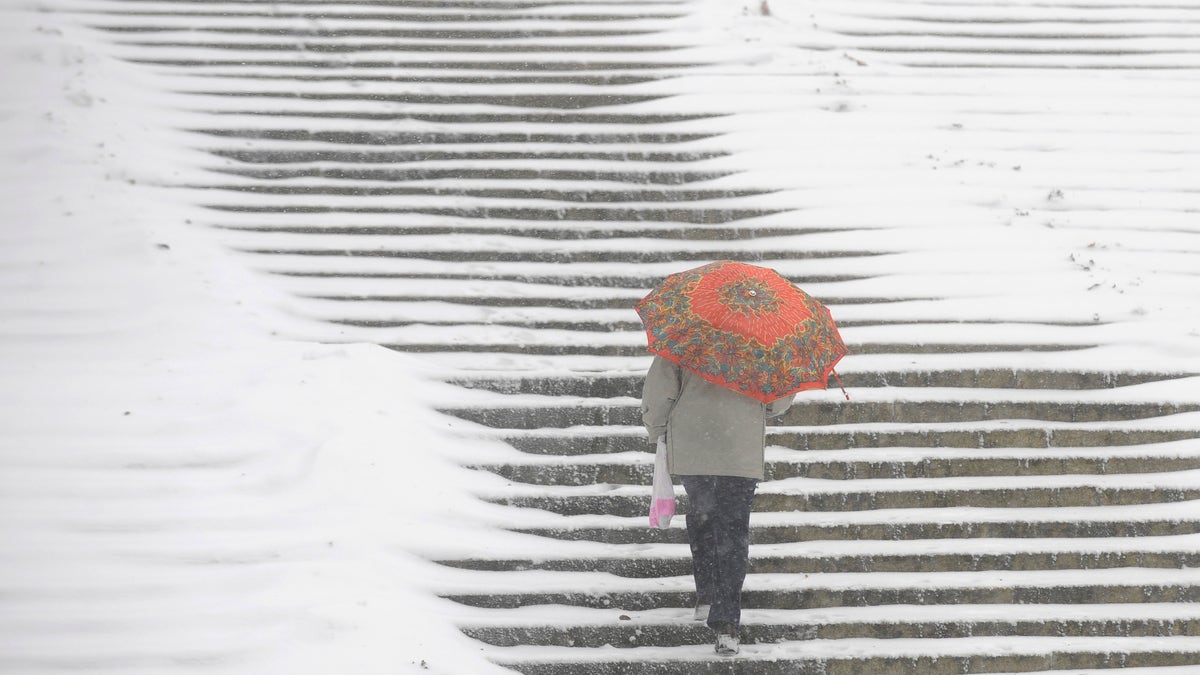
A woman walk up stairs in a park in Warsaw, Poland, Monday, Nov. 29, 2010, as first big snowfalls hit Poland this winter. (AP2010)
WARSAW, Poland – An Arctic chill killed a dozen people in Poland and snarled traffic and halted flights across Europe, freezing ducks in lakes and prompting animal lovers to open their cellars to shivering stray cats, officials said Friday.
Southeastern Europe struggled with some of the worst flooding in a century. Entire villages in Montenegro were submerged by the rising waters, with Interior Minister Ivan Brajovic describing the floods as "unprecedented."
With the latest deaths in Poland, the total number of people in Europe who have died of exposure in recent days has risen to at least 40.
It's "an early start to the winter because we are still in the autumn season," said Omar Baddour, a scientist with the World Meteorological Organization in Geneva. "It's not very, very unusual, but it is an extreme winter spell that is going to last a few days."
Baddour said that the cold comes from north-south winds pushing an Arctic chill over the continent, a phenomenon also seen at the start of last year's long and frigid winter. Most of the time, winds blow from west to east over Europe.
But he said it's too soon to say what the early winter weather — which usually sets in around Christmas — might herald for the continent this year.
In many parts of Europe, train services reported more heavy disruptions because of icy tracks, but air traffic was returning to normal in many places. Britain's Gatwick Airport reopened after heavy snowfall forced a 48-hour closure, though its website warned of delays and cancellations as freezing temperatures persisted. London's Heathrow Airport was operating, but 45 arrivals and 25 departures were canceled.
The Charles de Gaulle airport in Paris was again operating normally, but many areas of France faced traffic problems because of the snow.
In Poland, police reported 12 deaths overnight, raising the death toll there to 30 over the past three days. Police were carrying out street patrols in hopes of getting drunks and homeless people into shelters since they make up the bulk of those who freeze to death each year.
Animal lovers in Poland were also mobilizing, with some opening their cellars to stray cats and others pulling ducks from frozen lakes. Foresters have also been putting out fodder for bison, elk and other forest-dwellers.
In the Czech Republic, the death toll rose to four after a man was found frozen in Prague. In Germany, three people have now been killed, while authorities in northern England said they had found the bodies of two elderly residents this week who are believed to have frozen to death.
Authorities in the Alpine nation of Austria — no stranger to cold and snow — reported one death earlier in the week. The weather delayed some flights at Vienna's airport, where officials said a crew of about 80 people were working nonstop to clear runways and de-ice aircraft.
Just across the border in Slovakia, the snow caused traffic snarls in the capital, Bratislava, while a hospital in the eastern city of Presov treated dozens for injuries blamed on the snow.
Authorities have declared a state of emergency in three Balkan countries — Bosnia, Serbia and Montenegro — and evacuated hundreds of people after heavy rainfall caused severe flooding along the Drina River — the worst in 104 years. But floodwaters receded significantly overnight in Bosnia, leaving a trail of mud and debris in many areas.
___
AP reporters from across Europe contributed to this article.
